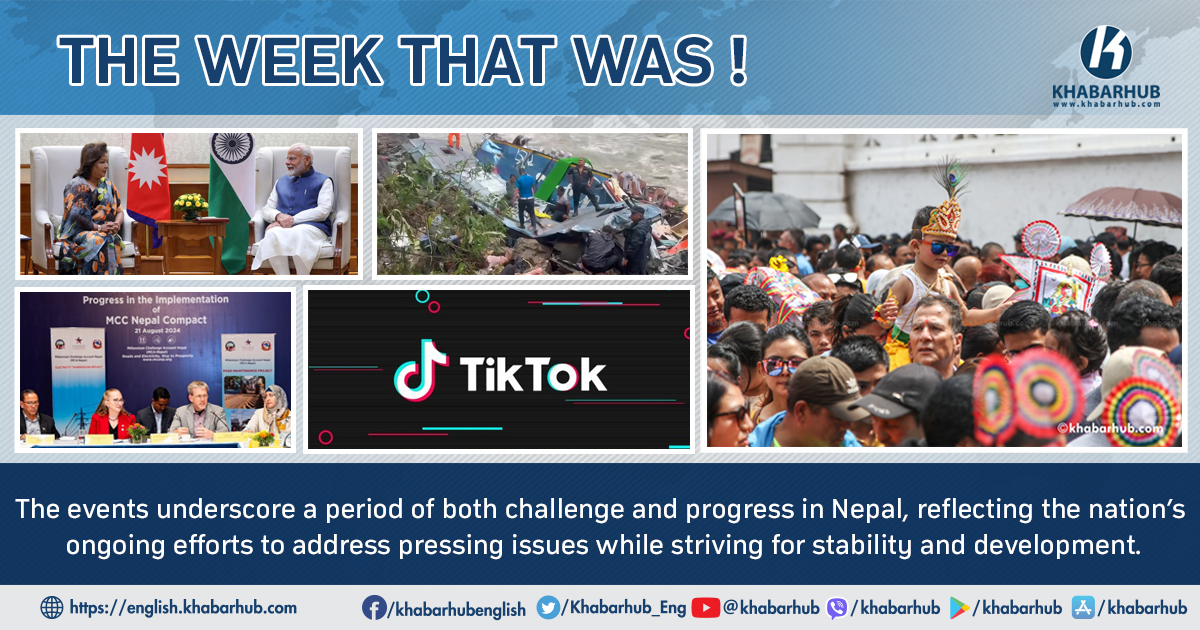KATHMANDU: Last week was marked by a series of significant and varied events across Nepal, highlighting both ongoing challenges and strides in various areas.
The events underscore a period of both challenge and progress in Nepal, reflecting the nation’s ongoing efforts to address pressing issues while striving for stability and development.
A Fatal Bus Accident: The week witnessed a tragic accident on the Prithvi Highway, where a passenger bus plunged into the Marsyangdi River near Anbukhaireni in Tanahun.
The accident resulted in the deaths of fourteen people, all of whom were Indian nationals. The incident underscored ongoing concerns about road safety in Nepal, particularly on its major highways, which are often treacherous and prone to accidents.
Despite the swift rescue of sixteen passengers, the high fatality rate highlights the need for improved safety measures and infrastructure.
TikTok Ban Lifted: In a notable policy shift, the Nepalese government decided to lift the ban on TikTok. This decision came after TikTok committed to complying with Nepalese laws.
The ban, initially imposed due to concerns over social harmony and the platform’s cooperation with law enforcement, had stirred controversy and affected users and businesses relying on the platform.
The reversal of this ban indicates a willingness to balance regulatory concerns with the demands of the digital economy and public sentiment.
Transitional Justice Legislation: The United Nations welcomed Nepal’s adoption of new transitional justice legislation aimed at addressing human rights violations from the civil war.
The new act, which focuses on investigating enforced disappearances and truth-telling, represents a critical step towards reconciliation and accountability.
The UN’s endorsement reflects international support for Nepal’s efforts to come to terms with its past and emphasizes the importance of these measures in the broader context of peacebuilding and human rights.
Diplomatic Developments: Foreign Minister Dr. Arzu Rana Deuba’s visit to India brought notable diplomatic engagements. Her meetings with Indian Prime Minister Narendra Modi and Foreign Minister S. Jaishankar were significant, highlighting the ongoing efforts to strengthen Nepal-India relations.
The invitation extended to Modi to visit Nepal symbolizes an attempt to bolster bilateral ties and address mutual interests.
These discussions also mark the first high-level visit since the formation of the new government in Nepal, indicating a renewed focus on international diplomacy.
Political stability in Lumbini Province: Chief Minister Chet Narayan Acharya’s successful vote of confidence was a significant political development, ensuring stability in Lumbini Province.
His support from a diverse range of political parties and one independent lawmaker reflects a relatively stable political environment in the province, following the formation of a new central government alliance.
This stability is crucial for effective governance and development at the provincial level.
Natural Disasters and Community Response: The landslide in Jajarkot, which claimed the lives of three family members, highlighted the ongoing vulnerability of communities to natural disasters.
The affected family was residing in temporary shelters for earthquake victims, which points to the long-term impacts of past natural disasters and the need for sustained support and preparedness measures.
Cultural Celebrations: The Gai Jatra festival, celebrated by the Newar community, showcased the rich cultural heritage of the Kathmandu Valley last week.
This vibrant festival, which involves parades and symbolic rituals to honor deceased loved ones, is an important cultural tradition that reinforces community bonds and cultural identity.
Electoral Participation and Security: The Rastriya Swatantra Party’s decision to contest upcoming local-level by-elections reflects the dynamic nature of Nepal’s political landscape.
The party’s participation is likely to influence local governance and political competition.
Concurrently, Education Minister Bidya Bhattarai’s call for enhanced security at Tribhuvan University in response to threats underscores ongoing concerns about safety in educational institutions, reflecting broader issues of security and public safety.
MCA-Nepal’s Progress: The Millennium Challenge Account Nepal’s progress in awarding contracts and implementing infrastructure projects, such as the 400 kV GIS substations, represents a significant step forward in the country’s development efforts.
This progress is indicative of the momentum in infrastructure development and the impact of international aid and cooperation.
Clarification on State Partnership Program: Prime Minister KP Sharma Oli’s clarification that no proposal on the State Partnership Program (SPP) was made during the recent visit by the US Deputy Secretary of State aimed to address concerns and rumors regarding this contentious issue.
The prime minister’s assurance reflects the government’s stance on safeguarding national interests while navigating complex international relations.









Comment